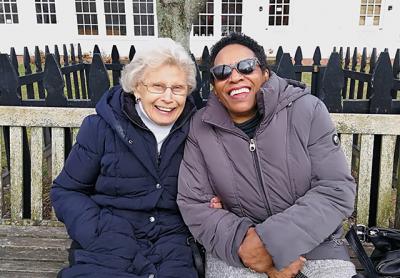Fighting Bias Since ’93

East Hampton has a reputation for being progressive and inclusive, but that does not mean it is immune to human-rights and civil-rights problems. And so it was that 25 years ago this coming July, the East Hampton Town Anti-Bias Task Force held its first meeting in the basement of Calvary Baptist Church in East Hampton. Soon, the group was making is presence felt all around town, moving its meeting to the Methodist Church and the East Hampton Day Care Center, too.
The committee was formed to address discrimination based on race, religion, age, disability, gender, and sexual orientation, or marital, familial, or socioeconomic status. Its aim is to promote diversity, unity, and understanding among the various ethic, economic, and religious groups that make up our community.
Members of the task force say they are determined to tackle bias by practicing what they preach: that is, through mutual understanding, not confrontation.
Two Anti-Bias Task Force board members, Audrey Gaines of East Hampton, who is the committee chairwoman, and Edna Steck of Montauk, believe that everyone is best served through the development of meaningful relationships, rather than heated debate and crisis management.
They embody the quiet and consistent advocacy they promote, and have spent the greater part of their lives working independently and together to tackle bias on the East End.
“We’ve known each other for about 50 years,” Ms. Gaines said.
“Not quite yet,” Ms. Steck corrected. “But definitely over 45 years.”
As founding members of the East Hampton Anti-Bias Task Force, they helped the group build and maintain close ties with schools, police, government, houses of worship, and cultural organizations, citizens advisory groups, and not-for-profits.
Meetings are now held at Town Hall on Pantigo Road on the second Wednesday of every month, when the board convenes to discuss initiatives, events, and activities underway or under consideration. Members are appointed by the East Hampton Town Board, and meetings are attended by Sylvia Overby, deputy supervisor of East Hampton, who is the liaison between the town and the task force.
“The advantage of being based in Town Hall is that we keep acquainted with appointed and elected officials,” said Ms. Gaines. “People know us, and we know them. We have their ear if something comes up. They take note, especially when Edna speaks.”
If there is a disadvantage to meeting Continued from A1
in Town Hall, it relates to the perception of some residents, particularly immigrants, that showing up at a government building could involve personal risk. “This is not about East Hampton,” Ms. Gaines said. “It is a reaction to what is going on at the national level. People listen to the news.”
Ms. Steck agreed that the recent rise of anti-immigrant rhetoric across the country has changed the nature of the work they do. A new focus of the task force’s efforts has been to revert to former methods. “Because people are more wary than before about stepping forward or contacting us with concerns,” she said, “we have responded by being more proactive in getting the word out, in being visible.”
“We used to meet in random locations. Church basements, libraries. And now we’ve been getting back to that,” Ms. Gaines said. “We’ve been going into the communities directly. We take our talking points, our script. We want them to know who we are and what we do.”
While general meetings are public, the task force meets privately to review and respond to reports of specific bias-related incidents from individuals. “Complaints are handled in special sessions,” Ms. Gaines said. “We listen, consider the facts, then make referrals to organizations best suited to help.”
“That’s important for people to understand,” Ms. Steck said. “The Town Hall meetings are open to the public, and everyone is welcome, but the complaint process is confidential. We do not ask about residency status. We do not judge. Our job is to make sure that people who feel they have been discriminated against are heard and that they are provided with the right information and directed to the right resources.”
As far as the future of the East Hampton Town Anti-Bias Task Force is concerned, the two longtime board members have exactly the same hopes and dreams they had when they joined the group a quarter-century ago.
“No one should be treated poorly,” Ms. Steck said. “Everyone has the right to be treated with dignity, regardless of their status, preferences, or circumstances. We want to continue to help people in our area appreciate the importance of this right.”
